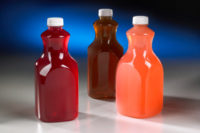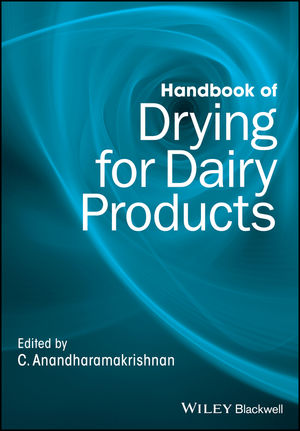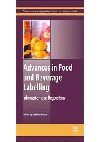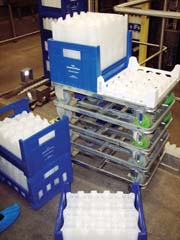
At its yogurt plant in this small city in southern Finland, Valio Ltd., a cooperative group with a 100-year history, has converted to a roll-in container system that uses metal dollies and plastic shippers.
"We do use a great deal of paperboard in our product packaging," explains Kalle Lepranta, marketing mgr., after noting the incongruity of a Finnish company withdrawing from the use of corrugated boxes. "And for those we have an excellent recycling program in place."
Valio is a company that prides itself on its efforts to minimize its environmental impact. The environmental profile of pallet-less reusable transport systems compares favorably to corrugated boxes which have the potential to either be recycled or to wind up in the waste stream. But a dairy executive in the farmlands of Iowa or in the Nevada desert faces many of the same issues that drove Valio to convert much of its domestic retail business to a system of roll-in racks, and its not just about the environment. Retail customers expect products that are easy to stock and produce little packaging waste. So Valio began looking for a solution.
In this case, giving the customers what they wanted also gave Valio the chance to completely automate the product handling and picking at the Riihimäki plant, and link its sales, logistics and production departments with completely visible, real time information. It now achieves 99.2% order accuracy while delivering fresh pastuerized products to clients all over Finland and neighboring markets.
Valio has spent more than $50 million on a logistics and cold storage expansion and automation project (with some production improvements thrown in) that will be completed in November after a year of planning and more than a year of construction and installation. The plant continued production during the project, and when Dairy Foods visited last month nearly all the improvements were up and running.
"We have been working on this project for so long, it is hard for us to say that it is complete, but it is almost complete," says Kai Hotakainen, project mgr.
At the center of the project is a fully automated downstream packaging and storage and picking system that incorporates 29 robots. It includes an automated storage and retrieval system, and five robotic picking stations that lead to a flow-through staging area that automatically places completed orders at loading docks where drivers roll them into trucks.
In recent years, as part of its coordination of operations at 16 domestic plants, Valio gradually transferred all yogurt production to Riihimäki. Products from other plants are commingled at the site which now handles more than 310 SKUs and dispatches 680,000 deliveries a year.
The new system helps keep more than 5 million liters of yogurt, buttermilk and other cultured milk products a week moving from the plant just an hour north of Helsinki to more than 230 delivery routes.
Built in 1967, the Riihimäki Dairy was originally owned by Osuuskunto Tuottajain Maito, one of the cooperatives that own Valio. At that point Valio was essentially a marketing unit, and all of the plant properties were owned by the individual cooperatives. It sits on about 42 acres, and with the latest expansion its footprint is about 484,000 square feet. It employs a total of 418.
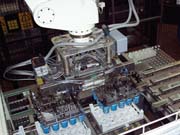
Fresh and flexible
The vast majority of Valio's products are fresh pasteurized, with only a small portion being UHT. Working with a 7-10 day shelf life, production capabilities have to be flexible. The Riihimäki plant reflects that business model.Raw milk is unloaded in one of two bays. In winter, trucks are washed first and the two bays can receive simultaneously. Drivers will begin raw milk tests after the milk has been collected from the last producer on the collection route. Tests are run for protein count and somatic cell count. There is 1.2 million liters of raw milk storage in 10 silos.
The milk is pasteurized and standardized in one of three APV units using plate heat exchangers.
Milk is inoculated in one of 12 batch tank systems to produce 13 different white bases for cultured milk, yogurt and other cultured products.
"About 98% is stirred yogurt (batch set), with just one product being cup set," says Hotakainen.
There are 14 different packaging lines. The plant operates six days a week with either two or three shifts in a given day.
Much of the yogurt and the small volume of milk processed at the plant goes into cartons. Carton fillers are primarily Tetra Pak and Elopak machines. One of them, an Elopak USE1160LZ has the capability to run four separate flavors simultaneously for mixed orders. It produces 16,000 1-liter cartons per hour. The plant also uses two Tetra Rex systems.
Many of the fillers use a peroxide sanitation of the packaging material to help establish a slightly longer shelflife (up to 14-30 days depending on the products), but none of the product is subjected to high temperature processing.
Fruit preps arrive at the plant in aseptic containers that hold up 1000 liters. A steam connection sanitizes the link between the tanks and the filling equipment.
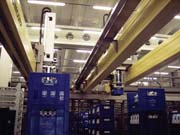
Touch-free logistics
The automated system is used exclusively for domestic and neighboring markets, while conventional boxing and palletizing is still used for a small amount of product bound for export. The system is being phased in, and as of last month, about half the plant's volume, and about a third of its product total was going into roll-in containers, which the company refers to as RICs. One other Valio distribution center is also using the system. Dollies and RICs now account for 85% of Valio's domestic and close-region (Finland, Sweden, Western Russia, and Baltic countries including Estonia and Latvia) markets."The logistics system is impressive, but the information system behind is even more amazing," says Mikael Svennas, logistics mgr. at Valio. "Logistics is now linked directly to sales and back to production."
Finnish company Cimcorp Oy, a former subsidiary of Swiss Log, was the chief vendor for the logistics system, Svennas says. Cimcorp (www.cimcorp.com) has refined a type of robot technology to suit a large number of different logistics applications including the manufacture of tires. The crate handling system employed by Valio has been used by Finland's No. 3 brewery as well. Both the tire and the crate are based on the same linear-gantry-robot principle.
According to Cimcorp, the linear robot arranged in a gantry structure has a number of benefits for logistics applications:
- Combined picking with storage in the same solution, in the same area.
- A flexible layout solution with a clear open floor under the robot.
- Adaptability for large and heavy loads as well as for small light goods.
- Operation at high speed, giving high pick capacities and high throughput.
- Reliability and ease of maintenance suited for demanding multishift logistics applications.
At Riihimäki, the system is in some respects, a modernized version of a traditional milk crate system. Components include large steel roll-in dollies that can hold 1-liter cartons by themselves and can be rolled into position in the store cooler case, plastic crates that can hold about a dozen one-liter packages, and plastic sleeves that hold individual yogurt cups. The plastic components are stackable and fit into a steel dolly base. They can be rolled into position in the store or the sleeves can be placed on shelves. The components fit into one another when empty to save space.
Empty containers returning to the plant are run through one of 13 washing lines of three different types for the different components of the system.
A photo-optic inspection system rejects any broken components before they can enter the system.
"Because it is so automated, this system could actually be vulnerable," Svennas says. "If a broken crate entered the system it would be difficult to detect because everything is so automated. That's why it's crucial to have such an accurate inspection system."
Once the components are cleaned and inspected, they are robotically stacked in a space-saving configuration and sent to a staging area, if needed.
"That can also be bypassed during production, so that if they are needed they can be conveyed directly to production," Svennas adds.
Each filler can be tied to one of a series of robotic case packers that fill the sleeves, or crates or directly into the dollies.
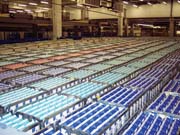
Picking and integration
After the containers are automatically filled with packaged products coming from the fillers, those containers are conveyed to the warehouse and logistics area.With the recent additions, Valio's Riihimäki facility has a total of nearly 51,000 square feet of warehouse.
This includes two floor levels of storage and picking. The lower level is where picking is done via forklifts for export markets. The automated system is located on the main floor of a brand new refrigerated warehouse. Keep in mind that this is all fresh product that is moved very quickly.
"We try to keep a minimum amount of back storage," Svennas says. "Most of the product we make in a given day's production will be on its way to customers that day or the next day at the latest."
Much of the high-volume products are loaded directly onto dollies from the filler. For smaller orders and lower volume products, the five robotic picking stations take over.
Each station frame is about 30 feet wide and about 115 feet long.
Within the frames, the servo-driven robotic motors run across the gantries suspended about eight feet above the floor. They can pick individual items as well as complete crates.
Cimcorp uses the term Modular Built Robot, or MBR to describe the robotic units. The company says their modularity makes them adaptable to a broad range of applications and plant capacities.
The robotically picked orders are married with the roll-in dollies that come direct from the fillers. Frozen food and manually picked items are cross docked on the same floor.
Once an order is filled, the roll-in containers are moved to a center flow through area where they are rolled out (currently by hand) to each loading dock.
The entire system is operated and monitored from a control room by three technicians per shift. A warehouse control system was custom designed by Cimcorp to meet Valio's needs.
The company says the systems can incorporate barcode labeling and are
RFID compatible. They can also be
used in conjunction with onboard radio data terminals.

Rolling to market
Valio made 1.7 million deliveries to customers in 2004. Pasteurized milk, the company's largest segment by volume is distributed direct by a dedicated fleet of independently- owned truck systems.The company uses a small number of two-tiered delivery trucks for longer routes in order to reduce overall mileage. It is estimated that the program saves nearly 2 million kilometers a year. The delivery distance in 2004 was 23.3 million kilometers. It is also running a trial with city delivery trucks that use recaptured industrial carbon dioxide as a refrigerant. The unique refrigerant system is nearly silent and uses no so-called greenhouse gasses.
Once delivered to the stores, the RIC systems can be rolled directly into place in coolers where consumers can take product directly from them. For those retailers who prefer to stock to store shelves, the units are much smaller and easier to maneuver than standard pallets.
Sidebox: Select Valio Vendors
Automated LogisticsRobotics and control:
Cimcorp Oy
Orfer Oy
Systems Integration
Insta Automation Oy
Filling Equipment
Elopak
Tetra Pak
Process Equipment
APV

Sidebar: Innovation for Sale
Valio's unique model includes the licensing of some of its best ideas
Finnish dairy leader Valio Ltd., celebrates its centennial this year, but it might just as easily celebrate ten years of redefining itself in a new business environment.
Finland was among the original nations that formed the European Union in 1995, and it shares a border and a history with Russia and the former Soviet Union. So in the last decade, Valio has had to adapt to doing business in a less sheltered market in its native land while exploring export opportunities at its doorstep in growth markets like Sweden, Russia and Estonia.
In the process, Valio had to change its structure (the dairy manufacturer is in fact jointly owned by 27 distinct cooperatives, with 13,500 members), and, oh, at the same time it has become a pioneer in probiotics and begun patenting and licensing its R&D technology to other players in every significant dairy market around the globe.
"In the mid 1990s some of our cooperatives left and became competitors," says Esa Laurinsilta, v.p of International Cooperation and Technology Commercialization. "We also began to see more competition from outside of Finland. But we continue to have an advantage in that we are the only company that has the infrastructure to serve all of Finland."
Valio realizes that to continue growing it needs to do more than dominate the tiny Finnish market (it has a population of just over 5 million) and maintain its strong presence in neighboring countries. It has found some obvious and some rather unique ways to enter the world market.
In the U.S. Valio's subsidiary Finlandia Cheese Inc., markets Swiss varieties under the Finlandia brand. Its main markets are on the coasts and cheese is sold through major retailers, delis, and foodservice, and it boasts 100% ACV in the Northeast.
Cheese and dry ingredients are a big part of what Valio exports worldwide, but unlike some European dairies it does not export aseptic milk, which has little market share in Finland.
At home, Valio has a tradition of investing heavily in R&D and a track record of developing innovative products. Its modern R&D center in Helsinki employs about 125 food scientists. So rather than exporting milk, Valio exports innovations. It now licenses the trademarked and patented R&D technology behind products like Gefilus with Lactobacillus GG, and reduced lactose and lactose-free milks to other dairy processors in markets throughout the world.
Gefilus, introduced in 1990 was Europe's first probiotic dairy product. In 2004 Valio launched a new series of "daily-dose" drinks in 100 ml Tetra Top micro carton bottles.
Valio has licensed rights to Lactobacillus GG to foreign partners like Campina in the Netherlands, Glanbia in Ireland and Iparlat/Kaiku in Spain. Valio also has licensees in Japan, Korea, Australia, Middle East and South America.
Valio has developed Evolus, a unique fermented milk drink that helps lower blood pressure, and has licensed the cholesterol-lowering ingredient Benecol from another Finnish company Raisio.
One of the most exciting recent developments at Valio has been in the area of lactose reduction.
Finnish population has a high awareness of lactose intolerance, and Valio developed a wide range of lactose hydrolyzed products around 20 years ago. Today Valio has taken this development a step further by developing totally lactose-free dairy products.
In 2004 Valio made an agreement with Tetra Pak to market this technology together worldwide.
What's most exciting about it is the success it has had at home where overall milk sales, declining steadily for many years, have actually begun to level off. And the lactose-free milk may be a contributor.
"We expected it to be a niche product," Laurinsilta says. "But we are selling about 25 million liters a year."



